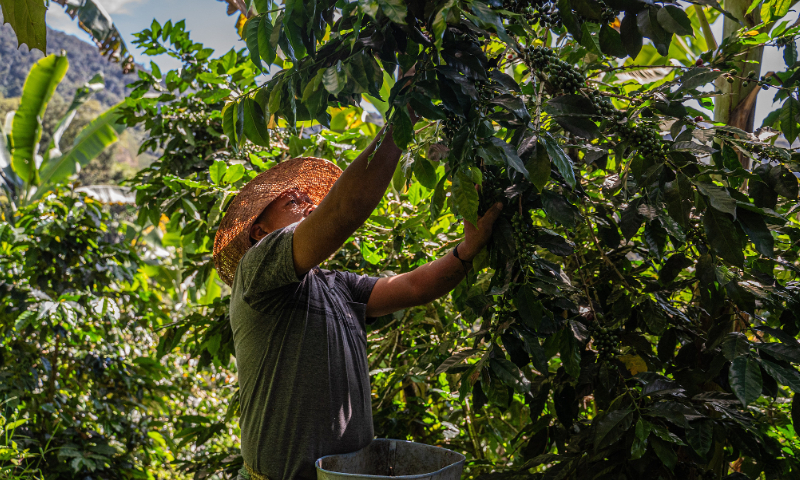Colombian business keen on expanding market share in China, wooing Chinese investors: trade official

A worker harvests coffee at a farm in Ciudad Bolivar, Antioquia department, Colombia, on July 23, 2023. Photo: VCG
Colombian companies hope for more market share for a wide range of agricultural products, such as beef, avocados, bananas, flowers and chocolates in the Chinese market. They also hope Chinese companies can find more investment opportunities, a Colombian trade official told the Global Times in an exclusive interview on Monday, before the Colombian president's state visit to China.
Gustavo Francisco Petro Urrego, president of the Republic of Colombia, will pay a state visit to China from Tuesday to Thursday, Foreign Ministry spokesperson Hua Chunying announced on Monday.
"We expect that this presidential visit will strengthen bilateral trade between both our countries. We hope that we can explore more export opportunities in agricultural goods and manufactured products," Oscar Felipe Rueda Plata, commercial counsellor with the Colombian Embassy in China, told the Global Times on Monday.

Oscar Felipe Rueda Plata Photo: Courtesy of ProColombia China
Rueda noted that there is significant potential to expand trade, mainly in agricultural products as "China has a very big population, and in Colombia, we have a lot of land."
Although coffee has up to now been Colombia's most important agricultural export to China, "we do see very good opportunities for other products, such as beef, avocados, bananas, flowers, chocolates and many others," said the trade official.
In 2022, bilateral trade reached $22.64 billion, with China's exports worth $15.6 billion and imports from Colombia worth $7.04 billion.
"We also expect that this visit can give us a chance to invite more Chinese companies to go to Colombia, get to know our country, and study different investment opportunities in sectors such as infrastructure, energy, agriculture, and technology," said Rueda, who is also director of the commercial office of ProColombia in China. "We hope that more companies can come to Colombia and contribute to the development of our economy, especially the green economy such as constructing renewable energy plants."
Colombia is one of the largest economies in Latin America, behind Brazil, Mexico, and Argentina. It has seen steady economic growth for over a decade, with just one exception in 2020 due to the COVID-19 pandemic.
A number of Chinese companies including BYD, Huawei, ZTE and Xiaomi are among the leading investors in the country.
The Bogota Metro Line 1 project in Colombia, contracted by China Harbor Engineering Company and Xi'an Metro Company, is currently the largest Chinese investment in the country.
In Colombia, it is possible to hail a car with a Xiaomi phone using a mobile app offered by Didi, and in a few years' time it will be possible to take a subway built by a Chinese firm, according to one Chinese source who has spent years in the country.
In 2022, China overtook Japan as Colombia's top investor from Asia.
China's economic and trade cooperation with Latin American countries has entered a fast track.
At the just-concluded third Belt and Road Forum for International Cooperation in Beijing, China inked inter-governmental agreements with Argentina and Chile and Chinese companies inked deals to expand the Punta Huete International Airport in Nicaragua.
On October 18, Chinese Ambassador to Colombia Zhu Jingyang met with Colombian Minister of Transport William Camargo, according to a statement posted on the embassy's website. Zhu said China is willing to deepen bilateral cooperation on transportation under the framework of the Belt and Road Initiative.
Camargo said Colombia is willing to actively take part in Belt and Road cooperation and push agendas on reinvigorating the Colombian national railway system and transportation infrastructure.


